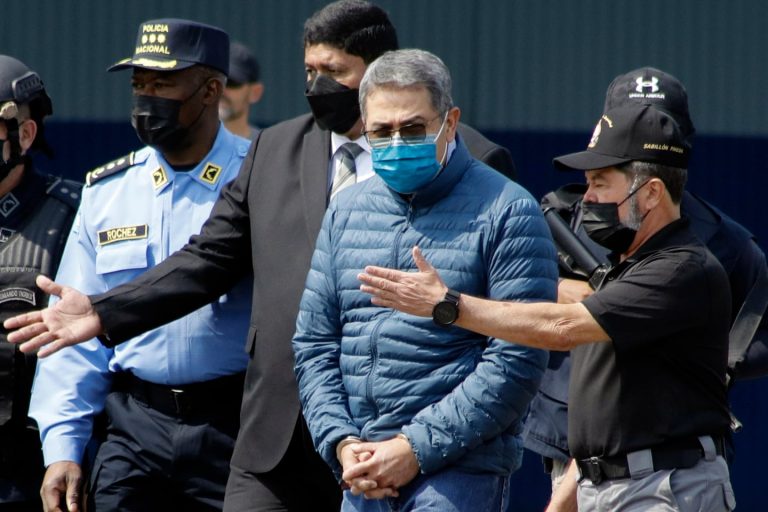But even as Hernandez headed what prosecutors described as the “narco state,” U.S. authorities continued to work closely with him. In December 2019, President Donald Trump praised the Honduran leader for his cooperation in reducing immigration and drug shipments. “We are stopping drugs at a level that has never been done before,” Trump said. Hernandez also met with Joe Biden and Mike Pence when each served as vice president.
“How could the United States government not have known these things were happening?” said Dana Frank, a historian and expert on Honduras at the University of California, Santa Cruz. “They chose to look the other way.”
Analysts say U.S. policy toward Central America in recent years has focused largely on reducing migration, sometimes crowding out other issues, such as corruption and declining democracy. But former U.S. diplomats said the DEA and Justice Department did not inform the executive branch that they were investigating Hernandez.
The case was one of the most important US trials of a Latin American leader since the 1992 conviction of former dictator Manuel Antonio Noriega, accused of making Panama a launching point for drug shipments to the United States. Noriega – a US partner during the Cold War – was captured in a US invasion of the Central American country.
Prosecutors alleged that Hernandez began cooperating with human traffickers in 2004, when he was a congressman. Over the next 18 years — including while serving as president from 2014 to 2022 — he helped traffickers move at least 500 tons of cocaine into the United States, according to the indictment.
In Honduras, many citizens celebrated the conviction. Carlos Castillo, 46, said: “The United States is doing something good for our country, because our authorities cannot do anything.”
Although the country's anti-corruption commission praised the ruling, it expressed doubts about whether Honduran politicians would change their ways. “Let's see if they learn from others' experiences, and understand that no matter how much power you have, the empire will collapse sooner or later.”
Hernandez's conservative National Party seized power after a 2009 coup that ousted leftist President Mel Zelaya. The party has controlled the country of 10 million people for more than a decade. But Hernandez's rule has been marred by corruption and drug trafficking scandals and allegations of wrongdoing during his 2017 re-election.
Opposition candidate Xiomara Castro – Zelaya's wife – won the presidency in 2021. Her Foreign Minister Enrique Reyna responded to Friday's ruling with a Latin phrase: “Iustitiae Factum est” or “Justice has been done.”
Hernandez's lawyer said he would appeal the ruling. The former president denied the US accusations and said many of the witnesses were convicted drug traffickers seeking reduced sentences or revenge. “I had a policy against all these people,” he testified. “They have caused huge damage to the country.”
Hernandez faces up to life in prison.
The trial provided an unusually detailed look at the way drug traffickers became major sources of campaign finance in Latin America, and how they bribed security officials and politicians to operate with impunity.
The case “is not just about Juan Orlando Hernandez, as a person, but about how these illicit networks operate,” said Ana María Méndez Dardon, Central America director for the Washington Office on Latin American Affairs.
Academic Frank said the trial presented a “strongly condemning” view of American policy. However, former US diplomats said Hernandez for years appeared to be a good partner, supporting extraditions and reforming corruption-plagued police. US data showed a decline in drug shipments during Hernandez's tenure.
“Today’s ruling makes everyone we cooperated with appear either complicit or naive in the eyes of the Honduran people,” said John Feeley, who was a senior official in the State Department’s Latin America Bureau during Hernandez’s presidency. “We weren't, but we weren't aware of the investigation the DEA was conducting while he was still in office.”
Hernandez was arrested on US charges in Tegucigalpa, the capital of Honduras, in February 2022, just weeks after leaving office. He was subsequently extradited.
Although American diplomats may not have been aware of any drug ties during the first phase of Hernandez's presidency, the accusations have accumulated in recent years. In 2019, his brother Tony was convicted in a US court on drug smuggling charges. US prosecutors said the brother received a $1 million donation from Sinaloa cartel leader Joaquin “El Chapo” Guzman in 2013, intended for Juan Orlando Hernandez, who was then running for president. (Hernandez denied the allegation.)
In 2021, during another trial, US prosecutors described a meeting between Hernandez and the accused smuggler, Giovanni Fuentes Ramirez, in which the then-president allegedly said they would “shove drugs into the noses of Americans.” The former Honduran leader denied making the statement.
In recent years, federal prosecutors in New York have convicted several major Latin American drug traffickers, as well as officials accused of helping them. Last year, former Mexican Security Minister Genaro Garcia Luna was convicted of accepting millions of dollars in bribes from the Sinaloa drug cartel.
But not all cases resulted in guilty verdicts. In 2020, US prosecutors accused former Mexican Defense Minister Salvador Cienfuegos of working with the criminal underworld. The Justice Department eventually dropped the case amid internal questions about its tenacity and the reaction of the Mexican government, which threatened to significantly reduce anti-drug cooperation.
Loren Rios in Monterrey, Mexico, and Paolo Serrato in Tegucigalpa, Honduras, contributed to this report.

